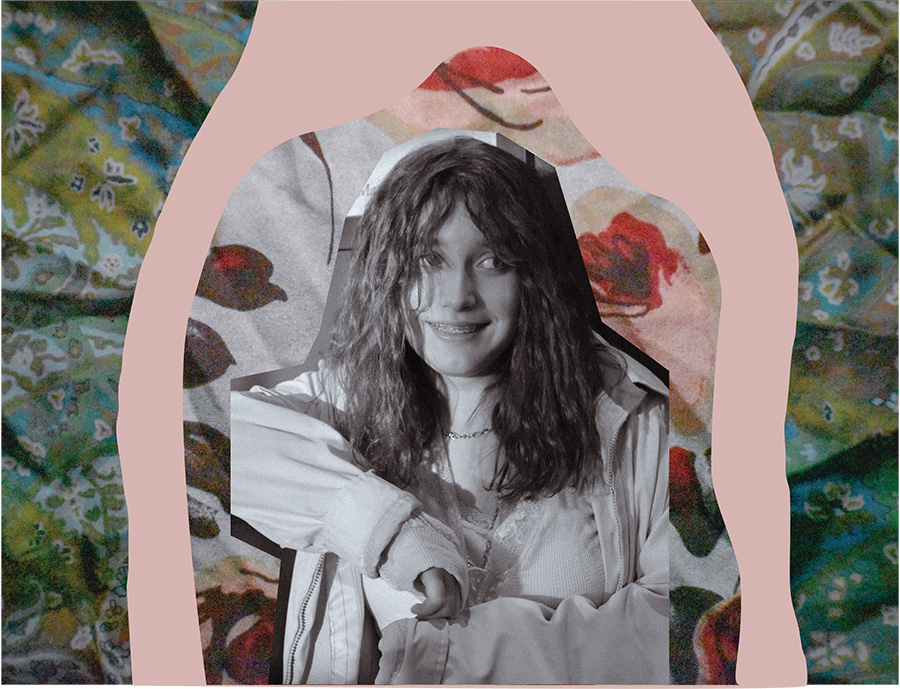Regrowing confidence
Ellie Garcia ’21 shares her experiences with alopecia areata and how they have shaped her since the beginning of high school.
In this profile, Ellie Garcia ’20 opens up about her experience with alopecia. She says she is “thankful for how it helped me grow.”
Like any typical teenager, Ellie Garcia ’21 loves sweet treats and spending time with friends. On one hot summer day in Maryland, before her freshman year, she decided to go out and get ice cream with a group of them. As she devoured her ice cream, a friend decided to braid Garcia’s hair, but while they went along the strands, they soon came upon a bald spot.
Garcia told her mother about the incident, and they decided to visit the doctor. Initially, the two were told that there was nothing to worry about. She was given an ointment, her vitamins were checked and she was sent on her way. However, as more of her hair started to fall out, the family visited another doctor. That was when Garcia was diagnosed with alopecia areata.
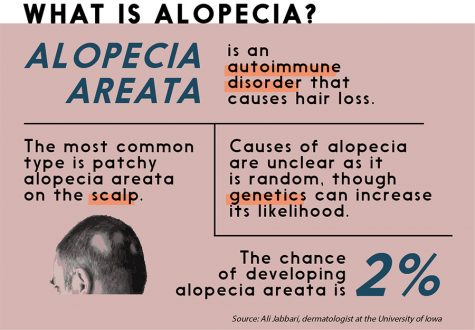
Alopecia areata is defined as an autoimmune disorder that is mainly known for affecting the hair on the body. According to Dr. Ali Jabbari, a dermatologist at the University of Iowa, the immune system targets the hair follicles on an individual, presuming that they are dangerous, which causes their hair to fall out.
“The immune system is the part of the body that fights off bacteria and viruses and foreign invaders,” Jabbari said. “Sometimes it gets its wires crossed, so to speak, and it starts attacking the person it’s supposed to be defending.”
Many questions soon flooded Garcia’s thoughts, as this was a condition that she had never heard of before. Her condition only became worse after she was prescribed medication and had to deal with constant injections on the scalp to treat her alopecia.
Once school started up again, Garcia walked down the halls daily with hoodies, hats or her hair strategically tied back in order to cover up her bald spots.
“I was just kind of tired of it because I felt like I didn’t really want to express myself in any way. I felt ashamed,” Garcia said. “There was also the frustration. Nothing was working, and I was just getting put on more steroids, more needles, more this and that … I was just like, ‘This is stupid. I just want hair.’ I feel like that was the main thing. It’s simple, but it just messed up my self-esteem.”
As Garcia progressed through freshman year, she started to notice some stares and began hearing whispers of gossip and assumptions. However, she realizes now that she found herself worrying about people criticizing her lack of hair more than those scenarios actually occurred.
“I feel like it’s not a thing where people are going to be like ‘Ugh, she’s bald,’ unless someone’s really mean, but most people are going to be nice when they learn about it,” Garcia said. “It’s just more of an internal thing, where I got to get to a point where I accept myself.”
Because of these fears, Garcia held back on many activities and quit karate for the fear of being noticed. When invited to a swimming pool or on a canoeing trip with her friends, Garcia would usually decline, worried that she would fall into the water and reveal her bald spots. At one point, she wanted to join the theater but didn’t want to risk her scalp being seen by an audience.
“I would avoid any possible situation where people would see my bald spots in, which is not good because it became a routine or the same day over and over and over again. I didn’t want to do anything that would possibly end with that,” Garcia said. “I just limited myself.”
At first, Garcia found it possible to cover up her bald spots, but it became increasingly difficult as her hair kept falling out. One of the major shifting points in Garcia’s journey with alopecia happened during the end of freshman year, as she was almost completely bald. According to Garcia, this was the moment she picked up the scissors and cut off the remaining strands of hair.
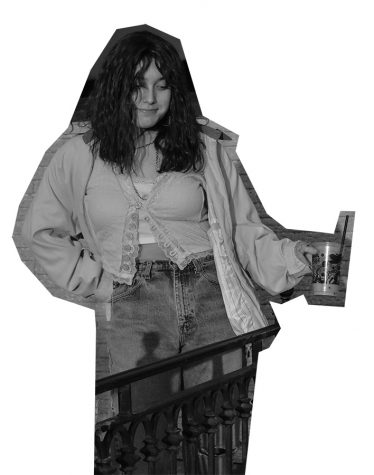
“I guess it feels weird because it’s so out of your control, but once you start being able to take control in small ways, it feels better, and that kind of helps overall,” Garcia said. “I spent most of freshman year trying to cling on to what I had left. Then sophomore year it was already all gone, so I just had to focus on the regrowth metaphorically and physically.”
After that moment, there were still hardships, but dealing with alopecia slowly started to improve as one certain individual supported Garcia throughout her experiences. Garcia met Kathryn Herbert ’21 during her freshman year, and the pair grew very close by sophomore year. Garcia started to wear wigs, but one of her personal victories was going out with Herbert without her wig on.
“She was one of the people that helped me just be more comfortable because she’s a very outgoing person who’s super social,” Garcia said. “Her confidence helped me just be like, ‘Whatever, it doesn’t really matter.’”
Herbert was with Garcia for many of the steps along the journey, such as Garcia telling others about her condition, so when she went out without her wig on, it was an incredible moment.
“I was so proud to be her best friend when she first went out without her wig on,” Herbert said. “She started ditching the wig when our friends got together.”
Herbert also mentioned how nervous Garcia was while they were going out, but during the experience, everything seemed to fall into place.
“She looked so pretty, and she looked really confident and happy walking around just being herself,” Herbert said.
Although Garcia continues to wear wigs in public, she realizes that the main change in her mindset is the fact that she is more open about her condition today.
“I guess I was just so paranoid freshman year, I thought people wouldn’t like me because of my alopecia, which is kind of dumb looking back because if they don’t like me for being bald then they’re probably not a good person to begin with,” Garcia said. “Now I don’t really care as much if people find out because what are [they] going to do about it?”
As Garcia continues to regrow her confidence, she aims to participate more in sports such as golf and is planning on taking tap dancing classes. She is proud of herself for overcoming her doubts and learning to accept herself.
“I used to be really mad that I had [alopecia], it just didn’t seem fair, but now I’m kind of not mad,” Garcia said. “It helped me not take things for granted as much … You kind of are forced to start loving yourself when you don’t like what’s going on with your outer self. So, I’m thankful for how it helped me grow.”
Your donation will support the student journalists of West High School. Your contribution will allow us to purchase Scholarship Yearbooks, newsroom equipment and cover our annual website hosting costs.

Fareeha Ahmad is a senior at West High, and this is her second year on staff. She is the profiles editor for print and the copy editor for yearbook. When...
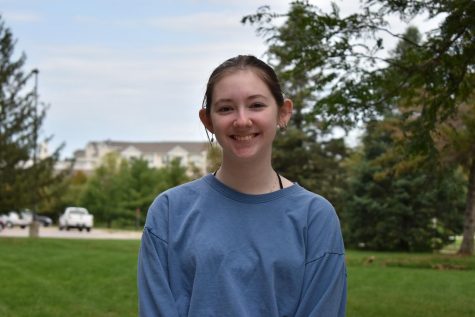
Cymry Hieronymus is a junior at West, and it is her first year on staff. She is a photographer, and when she isn't taking pictures, she likes to watch...
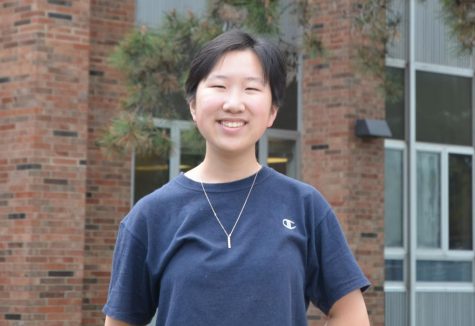
Brenda Gao is a junior and this is her second year on staff. She is the print Entertainment Editor and a designer. She likes playing Minecraft, painting...
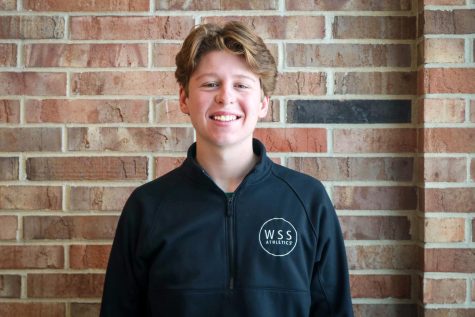
Owen Aanestad is a senior at West. This is his third year on staff working for the online publication as the online editor-in-chief In addition to playing...



